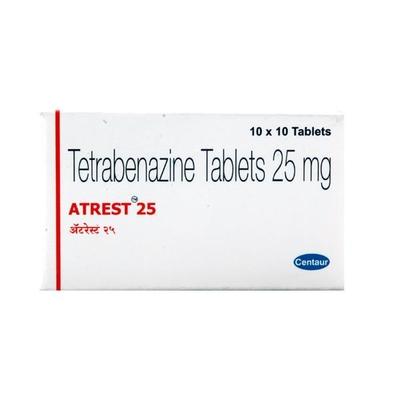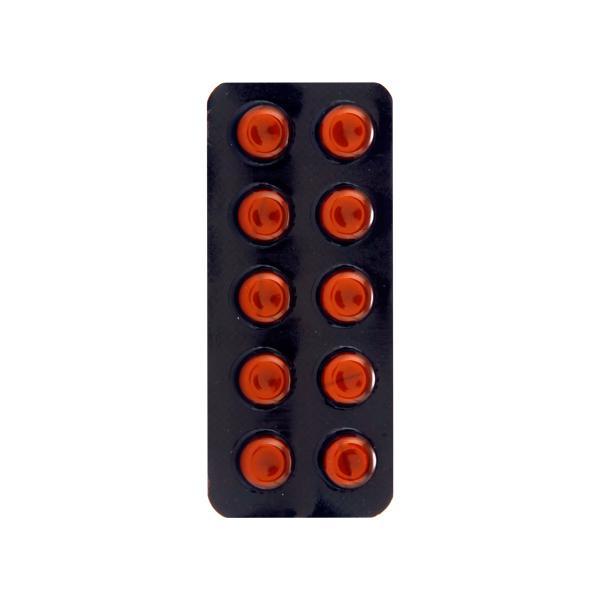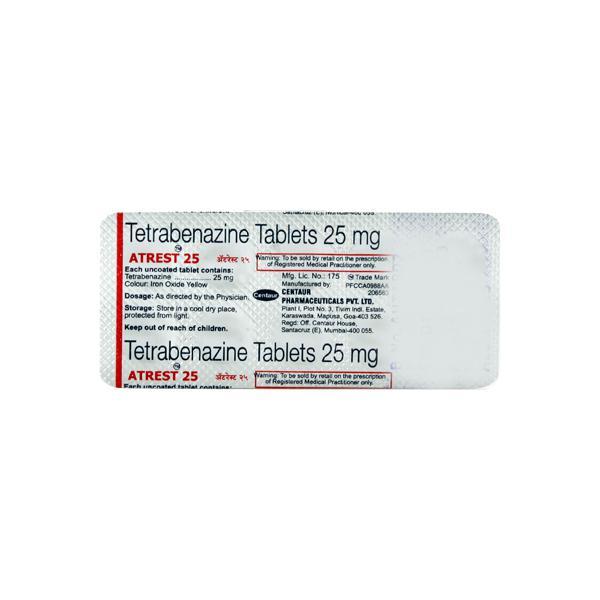

Netmeds First Membership
Quick Links
Introduction About ATREST 25MG TABLET
ATREST 25MG TABLET contains Tetrabenazine which belongs to the group of medicines called Vesicular monoamine transporter 2 inhibitors. ATREST 25MG TABLET is used to manage diseases that cause hyperkinetic motor disorders (such as jerky, irregular, uncontrollable movements) associated with Huntington's chorea (an inherited neurodegenerative disease) in affected individuals.
ATREST 25MG TABLET is not recommended for use in patients allergic to Tetrabenazine. It is also not recommended for use in patients suffering from Parkinson-like symptoms, depression, active suicidal thoughts, pheochromocytoma (tumor of the adrenal gland), and/or kidney disorders.
Before taking ATREST 25MG TABLET, inform your doctor if you are intolerant to certain sugars (such as lactose), and/or have heart problems (such as long QT syndrome, heart rhythm disorders), liver problems (such as mild, moderate/severe hepatic disorders).
ATREST 25MG TABLET should be used with caution during pregnancy and in women planning for pregnancy only if it is clearly necessary. It is not recommended for use in breastfeeding women.
The medicine is not recommended for use in children and adolescents (aged below 18 years) and is advised to be used with caution in elderly patients (aged 65 years/above) after consulting the doctor.
The most common side effects of taking ATREST 25MG TABLET are confusion, anxiety, sleeplessness, low blood pressure, nausea, vomiting, diarrhea, and/or constipation. Consult your doctor if any these symptoms worsen.
Uses Of ATREST 25MG TABLET
- Manage diseases that cause hyperkinetic motor disorders (such as jerky, irregular, uncontrollable movements) associated with Huntington's chorea (an inherited neurodegenerative disease) in affected individuals
How ATREST 25MG TABLET Works
ATREST 25MG TABLET works by inhibiting the absorption of certain chemicals (dopamine, serotonin) in brain which results in improved movements thus managing hyperkinetic motor disorders associated with Huntington's chorea in affected individuals.
How to use ATREST 25MG TABLET
Take ATREST 25MG TABLET as advised by your physician. Swallow the medicine with water. Do not crush or chew the medicine. Your doctor will decide the correct dose and duration for you depending upon your age, body weight and disease condition.
Side Effects Of ATREST 25MG TABLET
Common
- drowsiness (with higher dosages)
- Parkinson-like symptoms (such as uncontrollable movements of the head, legs, hands, arms)
- confusion, anxiety
- sleeplessness
- low blood pressure
- dysphagia (difficulty in swallowing)
- nausea, vomiting, diarrhea, constipation
- sweating
Uncommon
- mental changes (such as confusion, hallucinations)
- stiffness in your muscles
- fever
Rare
- signs of Neuroleptic malignant syndrome (life threatening reaction to antipsychotic drug) such as mental changes (confusion, hallucinations), stiffness in muscles, and/or temperature
Stop taking ATREST 25MG TABLET and contact your doctor immediately if you experience any of the following side effects:
- feeling sad/depressed
- suicidal thoughts
- have/plan to hurt yourself intentionally
How To Manage Side Effects
Nausea and vomiting:
Take ATREST 25MG TABLET with/just after a meal. Stick to simple meals. Avoid eating oil rich/spicy foods, sugary snacks and drinks. Avoid drinking too much liquid along with your meals, and drink slowly in between meals. Consult your doctor if the condition worsens.
Diarrhoea:
Drink plenty of water and stay hydrated. Try to avoid taking any medicine on your own to manage diarrhea. Consult and inform your doctor if the symptom worsens.
Constipation:
Try to eat high-fiber foods such as vegetables, cereals, fresh fruit, and drink plenty of water. Involve in regular exercise (going for a daily walk or run) and if this does not help, consult and inform your doctor for receiving alternate managements for constipation.
Warning & Precautions
Pregnancy
ATREST 25MG TABLET should be used with caution during pregnancy and in women planning for pregnancy only if it is clearly necessary. Consult your doctor before taking the medicine.
Breastfeeding
ATREST 25MG TABLET is not recommended for use in breastfeeding women. Consult your doctor before taking the medicine.
Driving and Using Machines
Do not drive/operate machines if you feel drowsy after taking ATREST 25MG TABLET.
Alcohol
Avoid consumption of alcohol while taking ATREST 25MG TABLET since the medicine may make you feel abnormally sleepy.
Kidney
ATREST 25MG TABLET is not recommended for use in patients with kidney disorders. Consult your doctor before taking ATREST 25MG TABLET.
Liver
ATREST 25MG TABLET should be used with caution in patients with liver problems such as mild, moderate, and/or severe hepatic disorders. Consult your doctor before taking ATREST 25MG TABLET.
Allergy
Do not take ATREST 25MG TABLET if you are allergic to Tetrabenazine, and/or any other ingredients of this medicine.
Heart Disease
ATREST 25MG TABLET should be used with caution in patients with heart problems such as long QT syndrome, and/or problems associated with heart rhythm. Consult your doctor before taking ATREST 25MG TABLET.
Others
ATREST 25MG TABLET is not recommended for use if you:
- suffer from Parkinson-like symptoms
- are diagnosed with depression which has not been managed or difficult to manage
- have active suicidal thoughts
- have pheochromocytoma (tumor of the adrenal gland)
- have prolactin-dependent tumors such as pituitary/ breast cancer
Before taking ATREST 25MG TABLET, inform your doctor if you:
- are a slow/intermediate metabolizer of an enzyme called CYP2D6 (enzyme responsible for metabolism of medicines)
- are intolerant to certain sugars such as lactose
Use in Pediatrics:
ATREST 25MG TABLET is not recommended for use in children and adolescents (aged below 18 years). Consult your doctor before taking ATREST 25MG TABLET.
Use in Geriatrics:
ATREST 25MG TABLET should be used with caution in elderly patients (aged 65 years/above). Consult your doctor before taking ATREST 25MG TABLET.
Interactions
A. Drug-Drug interactions:
Before taking ATREST 25MG TABLET, inform your doctor if you are taking any of the following medicine:
- reserpine (used to control high blood pressure and manage psychosis)
- antidepressants (used to manage depression) such as MAO inhibitors (Ex. phenelzine, selegiline)
- levodopa (used to manage Parkinson’s disease)
- opioids (used to control pain) Ex. oxycodone, hydrocodone
- antihypertensive drugs (used to manage high blood pressure) Ex. telmisartan, chlorthalidone
- beta blockers (used to manage heart problems) Ex. acebutolol, atenolol
- medicines used to manage psychotic disorders such as hypnotics (Ex. ambien, belsomra), neuroleptics (Ex. butaperazine)
- CYP2D6 inhibitors (medicines used to reduce the metabolism of certain medicines) Ex. fluoxetine, paroxetine, terbinafine, moclobemide, quinidine
- medicines that prolong the QTc interval in the ECG (Ex. haloperidol, droperidol)
- certain antibiotics (used to manage bacterial infections) Ex. gatifloxacin, moxifloxacin
- medicines used to manage heart rhythm conditions (Ex. quinidine, procainamide, amiodarone, sotalol)
Overdosage:
If you or anyone else accidentally take too much of ATREST 25MG TABLET, consult your doctor immediately or visit the nearby hospital. Symptoms of overdose are uncontrollable muscle spasms (affecting eyes, head, neck and body), uncontrolled rolling of eyes, excessive blinking of eye, nausea, vomiting, diarrhea, sweating, dizziness, feeling cold, confusion, hallucinations, drowsiness, redness/inflammation, and/or tremor.
Synopsis
| Drug | : | Tetrabenazine |
| Pharmacological Category | : | Vesicular monoamine transporter 2 inhibitor |
| Therapeutic Indication | : | Hyperkinetic motor disorders associated with Huntington's chorea |
| Dosage Forms | : | Tablet |
More Information
- Keep ATREST 25MG TABLET out of reach of children
- Store ATREST 25MG TABLET at room temperature
FAQs About ATREST 25MG TABLET
What is ATREST 25MG TABLET used for?
ATREST 25MG TABLET is used to manage diseases that cause hyperkinetic motor disorders (such as jerky, irregular, uncontrollable movements) associated with Huntington's chorea (an inherited neurodegenerative disease) in affected individuals.
What are the common side effects of taking ATREST 25MG TABLET?
The most common side effects of taking ATREST 25MG TABLET are confusion, anxiety, sleeplessness, low blood pressure, nausea, vomiting, diarrhea, and/or constipation. Consult your doctor if any these symptoms worsen.
How ATREST 25MG TABLET works?
ATREST 25MG TABLET works by inhibiting the absorption of certain chemicals (dopamine, serotonin) in brain which results in improved movements thus managing hyperkinetic motor disorders associated with Huntington's chorea in affected individuals.
How ATREST 25MG TABLET should be taken?
Take ATREST 25MG TABLET as advised by your physician. Swallow the medicines with a glass of water. Do not crush or chew the medicine. Your physician will decide the correct dose and duration for you depending upon your age, body weight and disease condition.
Can ATREST 25MG TABLET be used in pregnant and breastfeeding women?
Yes, ATREST 25MG TABLET can be used but with caution during pregnancy and in women planning for pregnancy only if it is clearly necessary. The medicine is not recommended for use in breastfeeding women. Consult your doctor before taking the medicine.
References
1. Goodman Gilmans. Treatment of central nervous system degenerative disorders. The Pharmacological Basis of Therapeutics. Twelfth Edition. 2011. Page : 436, 624.
2. Tatiana Yero, Jose A. Rey. Tetrabenazine (Xenazine), An FDA-Approved Treatment Option for Huntington’s Disease–Related Chorea. NIH National Library of Medicine. National Center for Biotechnology Information. PMC PubMed Central. December 2008. [Accessed on 1st June 2022] https://www.ncbi.nlm.nih.gov/pmc/articles/PMC2730806/
3. Joseph M. Ferrara, Giovanni Mostile, Christine Hunter, Octavian R. Adam, Joseph Jankovic. Effect of Tetrabenazine on Motor Function in Patients with Huntington Disease. NIH National Library of Medicine. National Center for Biotechnology Information. PMC PubMed Central. December 2012. [Accessed on 1st June 2022] https://www.ncbi.nlm.nih.gov/pmc/articles/PMC4389035/
4. Sun Pharmaceutical Industries Europe B.V. Electronic Medicines Compendium (EMC). [Revised in August 2021] [Accessed on 1st June 2022] https://www.medicines.org.uk/emc/files/pil.2668.pdf
5. Sun Pharmaceutical Industries Europe B.V. Electronic Medicines Compendium (EMC). [Revised in August 2021] [Accessed on 1st June 2022] https://www.medicines.org.uk/emc/product/2668/smpc












